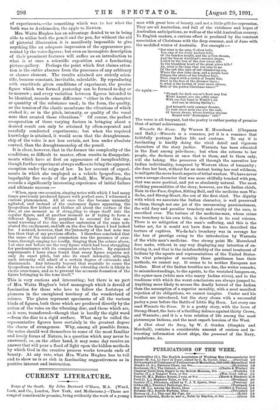Wanneta the Sioux. By Warren K. Moorehead. (Chapman and Hall.)—Wanneta
is a romance, yet it is a romance that faithfully portrays Indian life and customs. To say it is fascinating is hardly doing the vivid detail and vigorous characters of the story justice. Wanneta has been educated in the East among pale-faces ; but when she returns to her people, she declares at once that to them, and to them only, will she belong. She preserves all through the narrative her Indian individuality, tempered by Western ideas of humanity ; she does her best, without for an instant losing her real wildness, to mitigate the more harsh aspects of tribal warfare. We have never seen a savage character that was more skilfully touched with pen, that was more poetical, and yet so absolutely natural. The most striking personalities of the story, however, are the Indian chiefs, Rain in-the-Face, Gopher, Sitting Bull, and the medicine man Wa- da-ha, and Strong-Heart, the son of the first chief. The dignity with which we associate the Indian character, is well preserved in them, though not one jot of the unreasoning passionateness, the wild fury and peculiar treachery and cruelty of the race, is smoothed over. The torture of the medicine-man, whose crime was treachery to his own tribe, is described in its real colours. There is no mitigation of the man's suffering, and this is the better art, for it would not have done to have described the torture of captives. Wa-da-ha's treachery was in revenge for the loss of prestige owing to the introduction by Wanneta of the white man's medicine. One strong point Mr. Moorehead does make, without in any way displaying any intention of en- forcing it, and that is the indefensibility of the usual treatment of Indians by the agents and representatives of the United States. On what principles of morality these gentlemen base their methods, we cannot say. It seems to be neither European nor Indian. Most of the Indian troubles are due, the writer remarks, to misunderstandings, to the agents, to the wretched hangers-on, the squaw-men (white men who marry Indian wives), and to the readiness with which the worst conclusions are always jumped to. Anything more likely to arouse the deadly hatred of the Indian than the assumption of a superior morality, with a most manifest rejection of its obligations, we cannot imagine. Custer and his brother are introduced, but the story closes with a successful parley a year before the Battle of Little Big Horn. Let every one read Wanneta the Sioux. It is a pretty story, with the loves of Strong-Heart, the hero of a thrilling defence against thirty Crows, and Wanneta; and it is a true relation of life among the most picturesque Indians, and the most superb heroism of the West.


































 Previous page
Previous page